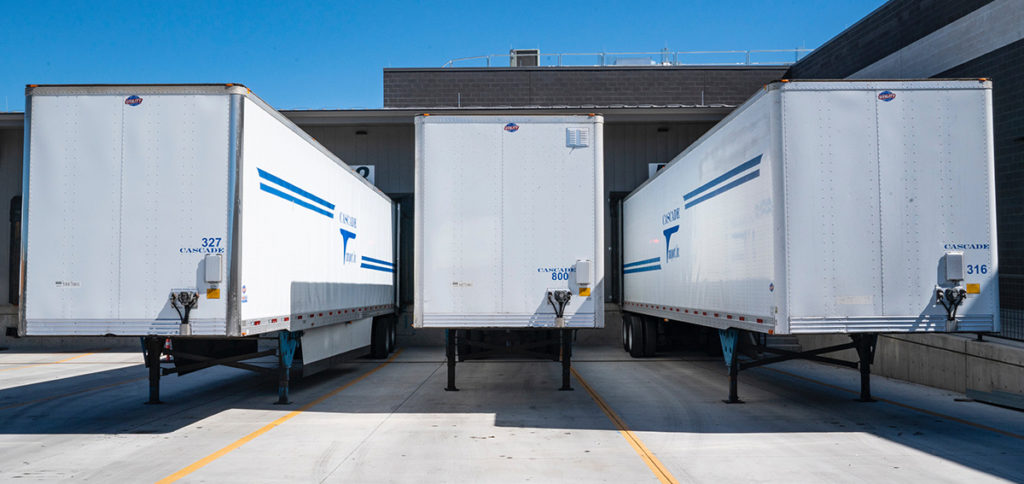Not enough freight capacity or drivers: logistics problems facing the beverage industry

The summer drought of 2018 served as a poignant reminder of just how dependent the economy is on transport. We all can recall the headlines that warned us about the rapidly approaching shortage of beverages. However, the impact of this on returning reusable bottles and the distribution to numerous points of sale was hardly mentioned in the press. Bottling companies are well aware of how serious the situation was, because they are also currently confronted with logistics problems.
The lack of freight capacity has been a particularly challenging logistics problem for quite some time. An extremely high demand for freight capacity stands in opposition to a low supply. This problem is due to a shortage of truck drivers. The lack of freight capacity and shortage of truck drivers was predicted years ago.
But hardly any freight forwarders took countermeasures. After all, they were rather preoccupied with surviving the tough competition within the logistics chain. Too many of them expected that the increasing demand for freight capacity would, in turn, lead to an increase in supply.
Source of the logistics problem
According to the German Federal Employment Agency, the number of available professional truck drivers in Germany has remained stable or has risen somewhat. But the true problem lies in the fact that approximately 29 percent of drivers are 55 years of age and older. Furthermore, there were more than twice the amount of truck drivers older than 65 years old than there were number of people training to become truck drivers in 2017.
This means that in the coming years, a disproportionate number of drivers will head into retirement, and there will not be enough trained people to fill the number of vacant positions. The situation will be further exacerbated by competition from trade and industrial sectors, which are also experiencing an increasing demand for skilled workers.

Moreover, the transport volumes for German trucks have risen disproportionately in recent years. According to the market observations made by Germany’s Federal Office for Goods Transport (BAG) (Annual Report 2017), the total weight of transported goods grew around 1.5 percent to more than 3.1 billion tons, thus resulting in the highest growth rate since the turn of the millennium. The predicted vacancy has now become evident. Tolling data reveals that the rising demand for long-distance transport is primarily absorbed by foreign shipping companies.
Impact on the dairy industry
The shortage of truck drivers and the associated lack of freight capacity not only have an impact on the beverage industry, but also on dairies in Germany. Experts from the industry frequently report that shipping companies are unable to deploy trucks due to a lack of drivers.
This has an impact on other areas such as the collection of raw milk, or the supplier industry and distribution. Consequently, shipping orders are postponed or cannot be carried out at all. Moreover, some of the shipping inquiries received by logistics service providers or as part of bids even go unanswered.

Driver capacity – a valuable commodity
The key to remedying the logistics problem lies in increasing the overall attractiveness of the occupational profile of professional drivers, so that the number of them increases – at least in theory.
There are approaches aimed at improving the situation, which can be applied by all those involved throughout the entire logistics chain. For example, logistics specialists can influence on-site conditions on the ramps, including aspects such as the fair treatment of driving personnel and relieving truck drivers from having to do work generally assigned to the ramp operators, such as unloading, packing or removing foil. In this context, driver capacity is a valuable commodity that belongs on the road.
The World Bank estimated in 2017 that in the following ten to 15 years, 40 percent of all German truck drivers will enter into retirement, thus resulting in a lack of 150,000 drivers in the 2030s. According to the Federal Association for Freight Forwarding and Logistics (DSLV) and Federal Association for Road Haulage, Logistics and Disposal (BGL), there are currently between 45,000 and 60,000 too few drivers.
Even though the situation in the freight market has eased somewhat, the critical situation is expected to continue in the long term. Freight forwarders can increasingly select destinations and decline freight shipments if the destination is difficult to reach or if it would entail long stretches with empty runs. Against the backdrop of tough competition that is characteristic for logistics services, “soft” factors can be the decision determinant today in accepting the bid. German dairies are encouraged to analyze their processes and, in doing so, actively contribute to attracting more drivers to this profession in the future.
drinktec 2021: Analyzing and optimizing logistics
Those interested can receive advice from pertinent consulting and software companies regarding solutions aimed at solving logistics problems, or information such as how logistics processes can be analyzed and optimized. A representative selection of such service providers can regularly be found at special events, which is also the case at drinktec, the world’s leading trade fair for the beverage and liquid food industry. Therefore, not only technology specialists are called upon to visit the next drinktec (September 13-17, 2021), but also colleagues from the logistics industry. Taking advantage of this dual strategy while visiting the trade fair will definitely be worthwhile!
